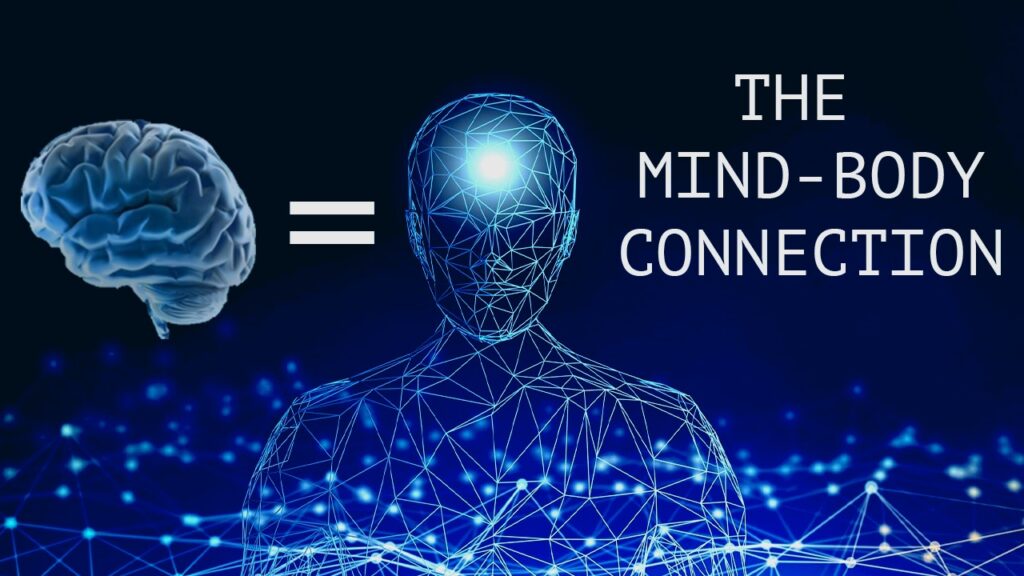Your mental and physical health are inseparable from the mind-body connection. Whatever happens in your body affects your mind, just as whatever happens in your mind affects your body. This is called the mind-body connection. When you become aware of this connection, you can improve how you live.

What is the Mind-Body Connection?
The mind-body connection links your thoughts, feelings, and physical health. Your body responds positively when you feel happy or relaxed. Physical symptoms like headache or tiredness may also appear if you are stressed or sad.
This connection demonstrates that caring for your physical and mental health is vital. A healthy mind contributes to a healthy body, while a strong body leads to improved mental well-being.
How Physical Health Impacts Mental Health
Mental well-being depends significantly on physical health; here is why
- Exercise Improves Your Mood
There are chemicals called endorphins, which are released into one’s brain when engaging in regular physical exercise.
These natural mood enhancers can help reduce stress, depression, and anxiety. Exercise also helps increase energy levels and makes you feel good more often.
2. Good Nutrition for Your Mind
Your diet affects how you feel. A well-rounded diet high in fruit, vegetables, and whole grains gives the brain the nutritional requirements to function optimally. Poor eating habits, such as too much sugar or junk food, can cause fatigue and mood swings, which will affect your physical and emotional health.
3. Sleep Influences Emotions
Sleeping poorly may make you irritable, anxious, or incapable of concentrating; it also reduces your body’s ability to defend itself against diseases. Getting good sleep cannot be overstated when trying to maintain a healthy mind-body connection and remain mentally sharp.
Relationship between Mental Health and Physical Health

The well-being of your mind has a direct effect on your physical body. Below is how emotions determine one’s physical wellness:
- Stress Strains Your Health
When you are stressed, your body releases cortisol. While this is normal in small quantities, extended anxiety can lead to high blood pressure, muscle tension, and digestive problems.
2. Anxiety Can Influence the Heart
Anxiety may speed up heart rate, thereby making breathing difficult for victims who experience it harder than usual while doing most activities.
This will cause a burden on your heart, which can create health problems. It is crucial to manage anxiety because it affects both your physical and mental state.
3. The Immune System Becomes Weaker Due to Depression
Depression may also weaken the immune system, making one prone to diseases. For example, caring for one’s mental health promotes a strong immune system and enhances the mind-body concept.
Tips for Balancing Physical with Mental Health
Finding a balance between the two doesn’t have to be complicated. Here are some simple methods you can use to ensure that your body-mind connection remains intact:
- Engage in Regular Exercise
Even thirty minutes of moderate exercise, such as walking or yoga, can lift your spirits and keep you in shape. Exercise helps build a stronger body-mind connection.
2. Eat Healthy Food
Go for nourishing meals that cater to both body and mind functions. Incorporate fresh fruits, vegetables, lean proteins, and whole grains into your diet while avoiding foods rich in sugar and fats.
3. Be Mindful
Mindfulness means paying attention to the present moment without judgment (Linehan 1993). It can help you reduce stress by using methods like deep breathing exercises, meditation, or even keeping journals with short daily entries on things that happened during the day. This allows one to free one’s mind from any stressors in life.
Mindfulness is one way of supporting your mind and body
- Ensure You Sleep Well
Aim to get between 7-9 hours of sleep each night to help your body regain strength. When you get enough rest, your body will be rejuvenated, and it will be easier for you to stay positive and manage the stressors that come with everyday life.
2. Develop Strong Relationships
Having people you love around can improve your mental health. They always make you feel cared for and supported. Good social relationships result in a healthy mind-body connection.
3. Get Professional Help When Needed
If you are struggling with your mental health, do not delay seeking assistance from a therapist or counselor. The same goes for medical checks with a doctor to verify whether our physical fitness levels are still up to standard. This helps ensure a balance between the physical and psychological sides.
Benefits of a Strong Mind-Body Connection
Among these benefits are
- Improved Energy Levels- Feeling more active and ready for new days thanks to keeping yourself mentally and physically in good shape.
- Better Focus and Productivity- Improved mental health means improved concentration, which leads to more effective ways of performing duties.
- Reduced Stress- Regular exercise, mindfulness, proper nutrition, etc., all contribute towards reducing stress levels, making you always relaxed.
- Fewer Health Issues– This reduces cases like heart conditions, diabetes, and depression, which arise from neglecting how we take care of ourselves from both perspectives: physically & psychologically
Challenges in Balancing Physical and Mental Health
Though there are advantages, handling the connection between mind and body is difficult. Busy schedules, lack of willpower, and limited resources make focusing on both areas difficult. Nevertheless, small, consistent steps can go a long way to achieving significant improvement over time.
Final Thoughts
Physical and mental health are interconnected; when one is taken care of, it also improves the other. The mind-body connection reminds us that well-being depends on a balance of both elements in our lives.
Incorporating healthy practices into your life, such as regular exercise, mindfulness, and balanced dieting, can create a strong mind-body connection and enhance your quality of life. You may begin today with minor changes that will soon benefit your physical well-being and brain capacities.


